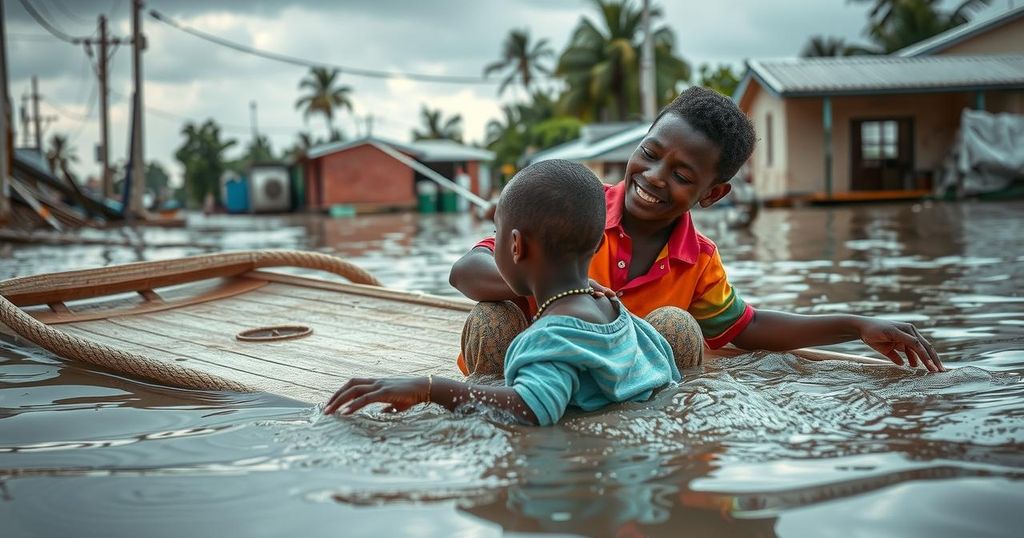Cyclone Chido Devastates Mozambique: 90,000 Children Affected

Tropical Cyclone Chido recently devastated Cabo Delgado province in Mozambique, impacting approximately 90,000 children and causing extensive damage to houses and schools. Over 174,000 people have been affected, with reports of destroyed classrooms and health facilities. The UN agencies, alongside local partners, are mobilizing relief efforts amidst ongoing humanitarian challenges in the region.
On the weekend, Tropical Cyclone Chido made landfall in northern Mozambique, particularly impacting the Cabo Delgado province with severe rains and winds. The United Nations Children’s Fund (UNICEF) reported that approximately 90,000 children have been affected by the cyclone, which has left over 35,000 homes destroyed or damaged and displaced several families. Additionally, more than 174,000 individuals overall have suffered due to the storm’s impact, and damage assessments are ongoing.
The cyclone not only obliterated homes but also wreaked havoc on educational and health infrastructures, with 186,000 classrooms and 20 health facilities reported destroyed. The cyclone’s eye touched near the city of Pemba, leading to significant destruction of civilian structures and utility networks. Mary Louise Eagleton, UNICEF’s Representative in Mozambique, emphasized that the region had been grappling with various crises prior to the cyclone, including conflict and disease outbreaks.
The Cabo Delgado province has been under the strain of conflict for over seven years, displacing more than 1.3 million individuals, predominantly women and children. For many affected by Cyclone Chido, their struggles have only intensified as the cyclone erased minimal progress toward recovery. The storm also damaged provinces such as Nampula and Niassa, impacting thousands of additional families and threatening to exacerbate existing cholera outbreaks.
In the immediate aftermath, the UN Refugee Agency (UNHCR) provided essential supplies to affected individuals, delivering emergency aid to over 2,600 people in Pemba. Preliminary assessments suggest that approximately 190,000 people urgently require humanitarian support, with substantial destruction reported in rural areas. UN Secretary-General António Guterres declared that UN teams are mobilizing to provide necessary assistance and support it as needed.
Emergency Relief Coordinator Tom Fletcher allocated $4 million for early humanitarian responses. With the alarming projection that 3.3 million Mozambicans will face extreme food insecurity in the upcoming year, additional measures from the World Food Programme (WFP) are anticipated to address these needs. The cyclone also had detrimental effects in Mayotte and southern Malawi, leading to infrastructural damage and risks for vulnerable populations. The situation remains critical and demands a concerted international response.
Tropical Cyclone Chido recently struck northern Mozambique, particularly affecting Cabo Delgado province, an area already suffering from years of conflict and climate crises. The cyclone’s destructive impact has exacerbated existing vulnerabilities among the population, especially children, who comprise a significant portion of those affected. The storm’s toll includes massive housing destruction, disruption of education, compromised healthcare facilities, and risks of increased disease outbreaks, notably cholera. Organizations like UNICEF and UNHCR are actively responding to assess needs and deliver humanitarian aid in a region that continues to face longstanding challenges.
In conclusion, Tropical Cyclone Chido has left a profound impact on northern Mozambique, affecting around 90,000 children and causing extensive damage to infrastructure and housing. The region, already burdened with previous emergencies, now faces increased vulnerability, particularly among women and children. Immediate humanitarian responses are essential to address the needs of over 190,000 people requiring urgent aid as emergency services mobilize to provide relief to affected communities. The international community’s support is critical as Mozambique confronts the aftermath of this devastating cyclone.
Original Source: news.un.org






